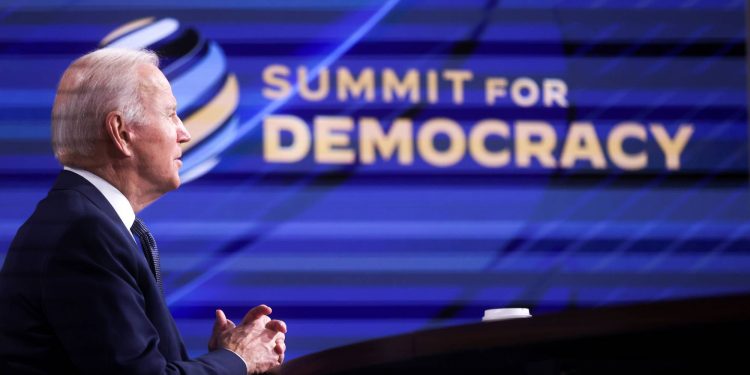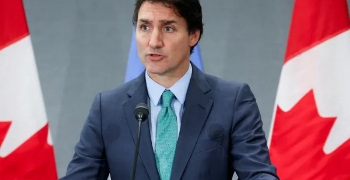The much publicised Democracy Summit organised by the USA in which leaders of over 100 countries, including India, participated last week appears to have turned out to be an inane exercise so far as democracy is concerned. It seems the aim was to bring together leaders of countries the USA considers friendly, no matter whether some of them make a mockery of democratic values in their own countries, so as to put up a show of unity against China and Russia which were not invited to the summit. It may be noted here that the history of the US has been full of instances where despotic rulers across the world have been assisted or propped by America. However, this is not an appropriate time in human history to revisit the sordid past of American misdeeds. The presence of Rodrigo Duterte of the Philippines and Jair Bolsonaro of Brazil, who are known for their anti-democratic actions in their respective countries, puts a question mark on the sincerity of the endeavour. Pakistan decided to skip the meeting presumably following pressure from China and in a way helped US President Joe Biden dodge criticism by his adversaries that Pakistan controlled by its military hardly qualifies to the description of a democratic state.
According to the US State Department, the goal of the summit was to provide a platform for leaders to announce both individual and collective commitments, reforms, and initiatives to defend democracy and human rights at home and abroad. The virtual summit, as the US calculated, would solicit bold, practicable ideas on the themes of fight against authoritarianism and corruption and promotion of human rights. But there is no explanation as to why some countries that can hardly be considered democratic were invited. According to a survey, over 30 per cent of the 110 invited countries are classified as ‘partly free.’ Three of them – Angola, the Democratic Republic of the Congo and Iraq – are described as ‘not free.’ The exclusion of countries such as Bangladesh and Sri Lanka raises serious doubts on the criteria applied for countries to be considered democratic. What brings more into question is that if the ‘quality of democracy’ and the respect for human rights were the criteria, which country is qualified to make that value judgement. The summit has been decried by Russia and China. In a joint rebuff, the Russian and Chinese Ambassadors to the US claimed their own states are democratic in practice, and criticised America’s role in effecting regime change and ‘democratic transformations’ in Iraq, Libya and Afghanistan. The timing of the summit itself – a brainwave of President Biden to showcase his democratic credentials as a counterfoil to his predecessor Donald Trump’s bullying tactic – was flawed. For, this year newest democratic entrants, Afghanistan and Myanmar, have switched over to autocratic regimes that rule by the power of the bullets rather than ballots. These developments put into serious doubt the efficacy of the international order in enforcing democracy through external interventions.
As such, the summit would have done well if it could in the first place formulate a globally accepted definition of democracy and a shared understanding of the challenges. It was not enough for the Biden administration to spell out specific targets on helping free media, ensuring free and fair elections and the participation of women, while identifying authoritarianism, corruption and human rights violations as key challenges.
Prime Minister Narendra Modi underscored the importance of the principles of ‘inclusion, transparency, human dignity, responsive grievance redressal and decentralisation of power’ in Indian democracy. But, the Modi government has invited widespread international criticism for going just in the opposite direction. The repression of the farmers’ agitation against now repealed farm laws, incarceration of civil rights activists under various draconian laws levelling trumped-up charges and attacks on minorities during the BJP rule since 2014 have besmirched India’s reputation as a democratic country.
The summit did not take note of Myanmar military junta’s continued killings of its people in fresh attacks. In one incident last week in a village – Don Taw – 11 people, including children, had reportedly been rounded up by the armed forces and shot dead. Their bodies were then set on fire. The gruesome killings triggered widespread outrage on social media. In the state-controlled media, however, the military denied the report and accused UN officials and others of interfering in Myanmar’s domestic affairs and relying on ‘distorted news.’ The villagers were learnt to be part of a resistance group fighting the junta.
The summit could have also taken up specific instances of attacks on democracy across the world to establish its credentials. By not doing so, it has only lent credence to the trenchant criticism by China that the main motive of the whole exercise was to revive ‘Cold War’ tension and isolate China.
Be that as it may, it is time the world comes to terms with reality. Today’s global situation clearly shows no one nation is capable of being the policeman for the entire world. Apart from dire economic distress of the past few years, the pandemic has made even the richest and the strongest to take a step or two backwards. In this perspective, it is now the responsibility of logical and democratic forces in every country to shed fear and participate openly in the formation of free and just systems.






































